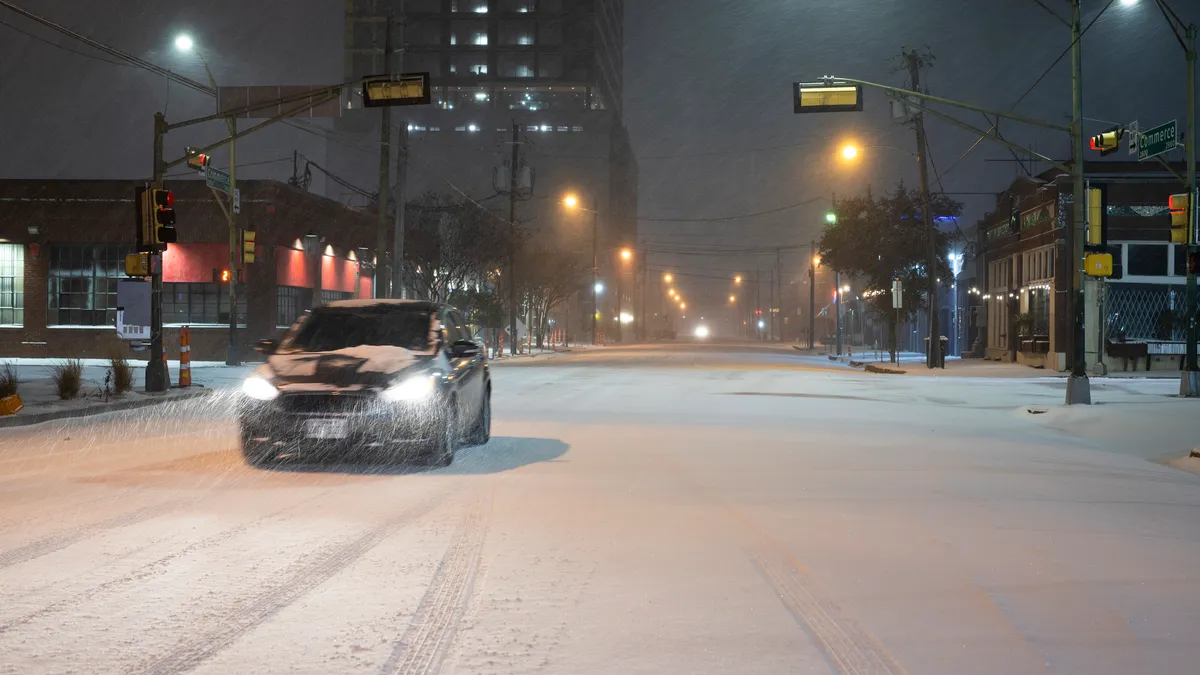Dive Brief:
- Gas-fired power plants fared better than wind during last week's winter storm, officials from the Electric Reliability Council of Texas (ERCOT) told utility regulators on Thursday, although overall the grid held up well and there were no widespread outages.
- ERCOT had been planning for storm loads in excess of 70 GW, but saw peaks of just 68 GW and 69 GW last Thursday evening and Friday morning, respectively, ERCOT Vice President of System Operations Dan Woodfin told the Public Utility Commission of Texas (PUC).
- The grid operator last year required power plants and transmission facilities to winterize, to avoid a repeat of the widespread outages that occurred during winter storm Uri. Wind outages last week peaked at 6.6 GW due to icing, Woodfin said, while there were only a "handful" of thermal outages. Some plants did struggle to maintain gas supply, however.
Dive Insight:
The PUC and ERCOT have been working for months to ensure the Texas power system does not have a repeat of 2021's deadly blackouts. Despite localized outages, regulators say the grid came through relatively unscathed last week.
ERCOT issued notices of expected operating conditions about a week before the storm, said Woodfin, move to end of sentence giving ample time for generators to prepare.
PUC commissioners credited last week's results to weatherization, preparation and changes to the market.
"These are real reforms in an incredibly short amount of time, yielding dividends in extreme weather," Chairman Peter Lake said, noting that during the peak of the storm the Texas grid had a "robust reserve" with about 85 GW available.
There were hiccups during the storm, however, and work continues at ERCOT and the PUC to reform Texas power markets.
While wind outages reached 6.6 GW of nameplate capacity, the wind generators actually provided more energy than ERCOT had projected. Wind production across the system was about 15 GW for Thursday evening's peak and about 12 GW for Friday morning's peak, Woodfin said.
"Thermal generation availability was good during the storm, with very few generation outages that could even possibly be because of weather issues," Woodfin said. ERCOT is in the process of investigating the "handful" of outages it did experience, he said.
"We did see some generation that was unavailable due to gas restrictions, particularly in North Texas," Woodfin said. A few units were offline or derated due to "gas pipeline pressure issues" he said. And about 2 GW of capacity that would otherwise have been unavailable due to gas restrictions ran on fuel oil instead.
Despite the outages, reserves remained sufficient and power prices moderate.
"By and large, the pricing impacts during this event weren't high enough to see really price respond to demand," Woodfin said. More data should be coming out in December, he added, in a report that will look at data provided by retail providers.
But some observers say last week's storm was not a real test of the Texas grid.
The storm was relatively short with only moderately cold temperatures, noted Alison Silverstein, an independent consultant working on Texas grid issues.
"Demand levels were low because lots of people and businesses hunkered down at home [without] raising thermostats in businesses because they were freaked out by last year's Uri disaster and the doom-watch lead-up to last week's cold weather event," Silverstein said in an email. "This storm was not a test of ERCOT's ability or the gas system's ability to meet another Uri-class storm."
Silverstein also added some additional detail on outages during the storm. There were about 1,509 MW of natural gas generation forced offline due to fuel constraints, and 1,041 MW of coal due to fuel issues, likely frozen conveyer belts, she said, based on ERCOT data.
The grid operator has already enacted some market changes for this winter. In December, the PUCT approved adjustments to the grid operator's scarcity pricing mechanism, lowering the high systemwide offer cap to $5,000/MWh from $9,000/MWh.
But more changes are in the works, including development of a backstop reliability service, and Commissioner Lori Cobos told ERCOT officials they needed to mix expedience with nuance.
"I just want to make sure that ERCOT opens up that hood and ensures that there's not any unintended consequences that will negate the market reforms and actions that we're seeking to take to enhance reliability and resiliency in the future," Cobos said.














